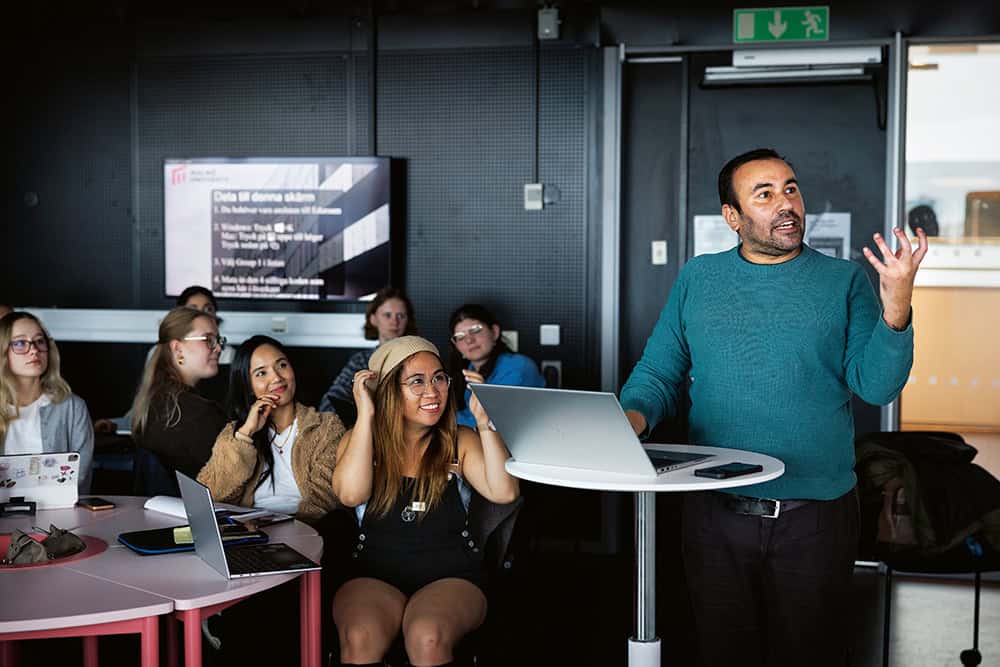Malin Broberg, Vice-Chancellor of the University of Gothenburg, wants to change the organisational structure so that the university will no longer be the host unit for the collaborative national units in which the university is a formal member. Instead, as a result of a strategic decision, they will be placed in different faculties.
Tomas Berglund is the director of the national unit and collaboration arena Wexsus, the West Sweden Nexus for Sustainable Development, which is run jointly by Chalmers University of Technology, the University of Gothenburg and University West. The University of Gothenburg is the host university for Wexsus, as well as for the Swedish Institute for the Marine Environment, the Swedish Secretariat for Gender Research, the Swedish National Resource Centre for Mathematics, Nordicom, the Swedish National Data Service and the Segerstedt Institute.
“We are working on the implementation of the Vice-Chancellor’s strategic decision on the basis of the intention behind it and are investigating different solutions,” says Berglund. There is an ongoing dialogue with the faculties about moving out, as he puts it.
The way it works today, he explains, is that the vice-chancellor and pro-vice-chancellor deal with the more operational issues and the pro-vice-chancellor has a dean-like role for the departments.
The dialogues will continue during the autumn, and probably also next year, to iron out the details of what the moves might look like.
“There is a logical rationale behind the decision,” he continues. “There is certainly a need for a different organisational form or format for the national units, and such a process will be set in motion somehow. Right now, we are having an open discussion on how to implement what the vice-chancellor wants to achieve.”
Pro-Vice-Chancellor Carina Mallard has been tasked by Vice-Chancellor Broberg with developing concrete proposals for where in the university’s organisation each national unit should be placed. In an email to Universitetsläraren, she writes that “the timetable for the whole process has not yet been finalised, but it is one of the things we are looking at in this initial phase. But we can see that the solutions may look different, depending on the unit.”
She also emphasises that the university management needs to focus on strategic issues and not work operationally with the leadership and management of the directors of the national units.
When asked what the change will mean for the national units in terms of their identity and finances, Mallard replies that the financial situation is currently being analysed and that the aim is not to have any impact on the identity or the mission of the units.
The process began after the summer, and while Tomas Berglund sees nothing unusual in how it has been run so far, he is particular about Wexsus retaining both its identity and integrity in any new organisational structure. The brand must remain intact, as must the approach of working across disciplines, both between scientific fields and between higher education institutions.
“I want to ensure that the integrity of our organisation remains intact, and that the vice-chancellor and pro-vice-chancellor also protect our brand in this process,” he says. “There is also the question of finances. We have a pretty favourable position today in purely financial terms, and there is a great danger that our costs will increase if we end up in a faculty or a department, or whatever the outcome is.”
He points out that he cannot speak for the other units, but that at Wexsus they do neither teaching nor research, but work for the benefit of all departments and faculties, as well as that of other higher education institutions. It is therefore unreasonable, he believes, that they should help to pay for the infrastructure for education and research at a faculty.
“The third thing that is crucial to us is the vice-chancellor’s involvement in the units that GU has committed to; that the management, the management structure, of such a unit, remains intact. Our highest decision-making body is the Wexsus general meeting, which consists of the vice-chancellors of three higher education institutions. We need the vice-chancellor behind us in a number of different discussions. For example for different relationships, contracts and agreements with other higher education institutions and, in our case, with municipalities and municipal associations.”
For Tomas Berglund, it is important for his unit, which is actually regional rather than national, that negotiations are not taken over by a dean or a head of department, and that the University of Gothenburg sees the value of what Wexsus does. He explains that each national unit has a very clear mission, often national, but in Nordicom’s case it is a Nordic mission. Funding for the units often comes from government ministries or, as in the case of Wexsus, from the Västra Götaland region and from other higher education institutions.
“It is a long process,” he says. “We are in no hurry. The work is ongoing, and we are looking at how we can move it forward.”
What are the national units?
The University of Gothenburg is the host university for a number of national units, all of which are part of a council for collaboration and exchange of knowledge and experience.
These are Wexsus, (the West Sweden Nexus for Sustainable Development), the Swedish Institute for the Marine Environment, the Swedish Secretariat for Gender Research, the Swedish National Resource Centre for Mathematics, Nordicom, (a knowledge centre in the field of media and communication), the Swedish National Data Service and the Segerstedt Institute, (a national resource centre to disseminate knowledge on how, when and why ideologically motivated violent environments arise).















